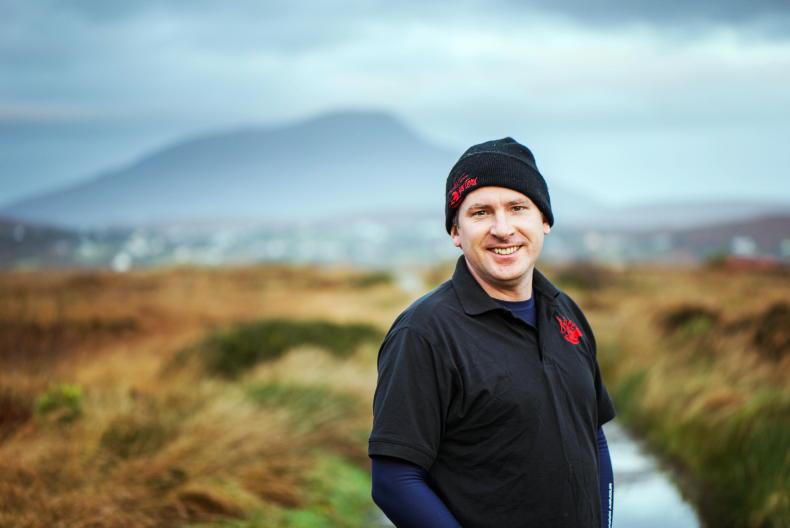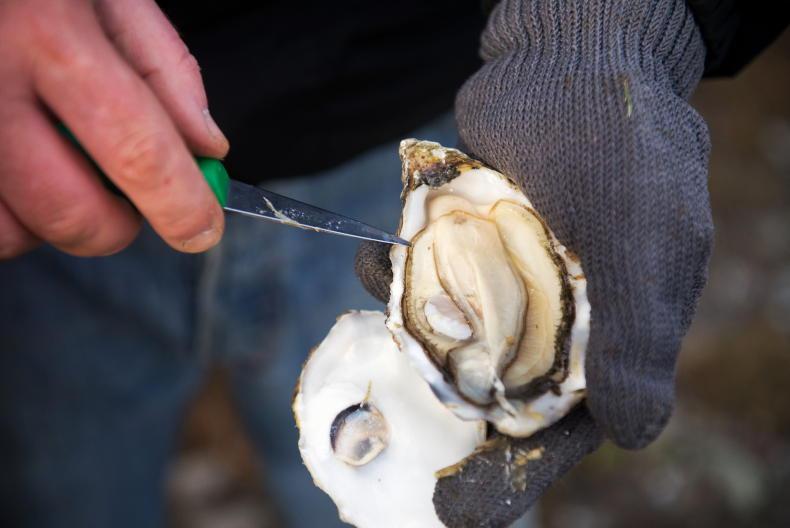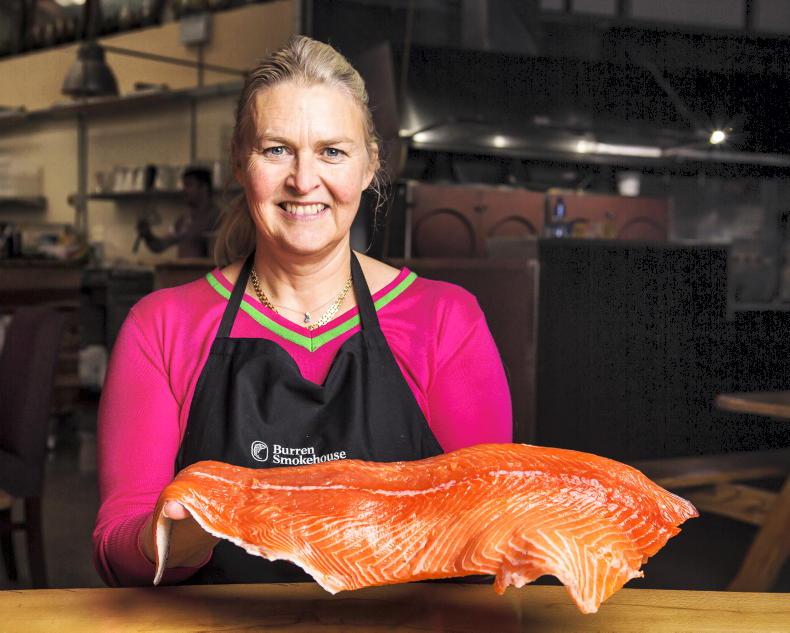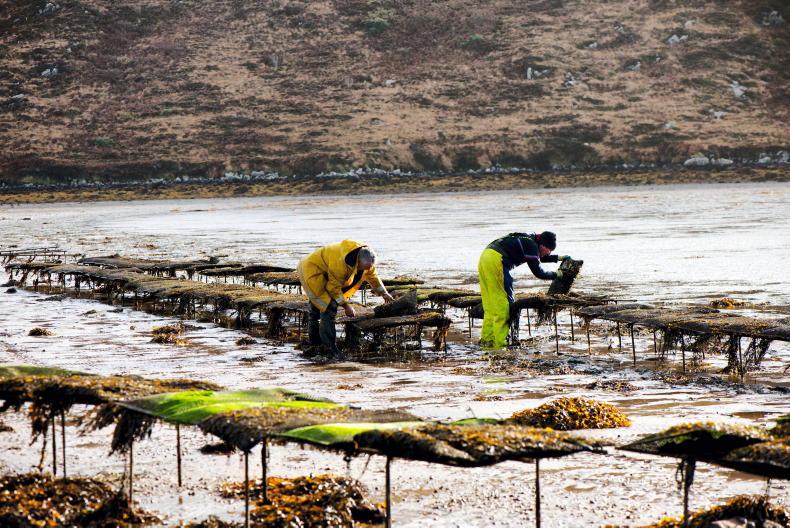Hugh O’Malley is the owner and founder of Achill Oysters. He wasn’t always out on the tides – for a good chunk of his life, education and career, he was in Wales and England, where he studied and worked in the IT industry. However, he always looked to the west and dreamed of starting an aquaculture business on his home island of Achill.
Irish Country Living spoke with Hugh about his business and how he got his start in aquaculture.

Hugh O'Malley, founder, owner and farmer at Achill Island Oysters.
What was it like growing up on Achill?
Growing up, my backyard went down to the sea. The next stop is St John’s, Canada. In 1996 I did my undergrad in Wales and my thesis was on sustainable businesses in the west coast of Ireland. Back then, the big thing in sustainable seafood was aquaculture. I grew up in a family where we’d seen the end of commercial fishing [at the family level]. Through a couple of different pivots, I ended up with the oysters.
When I was really young Dad had a trawler, and fishing was always discussed over the dinner table. Dad and my uncle had always been involved in fishing; even when they were working in England they would come back each year to fish in Achill, we had a traditional fishing boat. I would fish salmon in it with my dad and uncle; as was our tradition. It was commercial fishing on a very small scale. When we moved to England, I really felt that loss of tradition.
Your background is in IT – why make such a significant career move to aquaculture?
One day, during university, I was in Tesco and saw cod was twice the price of salmon, and the salmon was farmed. I thought: “If you can farm salmon you must be able to farm something else.” At college, I studied how to build a sustainable business, ecologically. 
I eventually went with Bord Iascaigh Mhara (BIM), to Castletownbere, and spent three months doing a course on aquaculture. I learned oysters had everything you could want in a sustainable business: from sequestering carbon to the positive impact of year-round business in the local community.
I also learned you can start relatively small – I started off with just a wheelbarrow; it was pure lunacy! I promised my wife it would only be part time, but it grew. I quit my day job and got everything rolling in 2013. It takes 2.5 to four years to grow an oyster to a sellable point. It was a lot of investment – time, effort, money – it has used every skill I’ve developed over the years.
Do you get enjoyment and fulfilment from this type of work?
I’ve been exceptionally lucky, this is a wonderful industry. So many have helped me grow the business. We got certified with Origin Green relatively easily because of how the business was set up. The key was growing exceptionally good oysters; the environment on Achill is, and hopefully always will be, ideal for doing so.
So many have helped me grow the business. We got certified with Origin Green relatively easily because of how the business was set up. My mantra was always this: “Grow aggressively, but not so aggressively that you cut your throat”. The key was growing exceptionally good oysters; the environment on Achill is, and hopefully always will be, ideal for doing so.
I’m living the dream. All those years spent dreaming, researching it. I thought it would only ever be a conversation piece and now it’s real. We employ 10 people at present.
Is this type of aquaculture considered a sustainable business model? How so?
We don’t operate in a controlled environment; we work with what nature provides. I chose this business model largely because it fit in with my culture. Achill boasts an unspoiled environment and aquaculture creates jobs in parts of Ireland that don’t lend themselves to other industries. The impact we have on the environment is as minimal as possible. Until very recently, all the work on the farm has been done completely by hand. We hand-shake the bags and work with the wind and tides. It is a sustainable model, as much as we can make it, and we endeavour to make it more sustainable by the month.
Who buys Achill Oysters?
The farm is in Achill, but the processing plant is in Ennis in Co Clare. We distribute our oysters globally, the processing area is ideally located close to to Shannon Airport, [which is how we ship our product]. It has grown immensely from the wheelbarrow! But, we haven’t reached our zenith. We hope to add to the employment as we continue to grow. COVID-19 has been a speedbump; there was no business or contingency plan [for it], but we’ve so far ridden it out.
In normal times, our largest market is in Asia. It’s a real eye-opener; seeing the sheer quantity of buyers there; how much they take and how much they love Irish oysters. There are huge markets there.
They’re not insatiable, but within our niche we provide a very good product. More recently, COVID-19 has provided the great opportunity to supply the indigenous Irish market – our online sales are up twenty-fold. There’s a real appetite for oysters in the Irish community.
www.achilloysters.com

Teresa Morrisey is the IFA aquaculture executive.
How did you start your career in aquaculture?
Ten years ago, the Marine Institute had a graduate (Stagaire) programme. I graduated with an environmental science degree from NUI Galway. I was about to leave the country when I got the job with the Marine Institute. At the time, oyster herpes virus was becoming a problem and I started working with the Fish Health Unit assisting with reports and certification for oyster movements.
From there, I moved from an admin-based position to lab-based research; working with the industry throughout. I was the point of contact with producers having problems with oyster herpes virus. I spent nine years working in fish health involved in research of oyster herpes virus, moving onto fin fish and crustacean diseases before starting my work with the IFA.
What can aquaculture enterprises bring to rural Ireland?
From an economic point of view, aquaculture is one of the fastest growing food production systems in the world - mainly because wild fisheries are not seen as sustainable source of seafood. If people want to eat fish and shellfish, we need other ways to produce seafood. Aquaculture is an industry being developed in many countries where jobs and food supply are needed - aquaculture solves both of those problems
In Ireland where we have coastal communities, there may not be a lot of employment options in those areas and aquaculture is providing opportunities and local employment. We’re an island nation - we really need to take the blue economy seriously and develop marine resources to capitalise on these opportunities. Salmon, oyster and mussel farms provide over a thousand local jobs where, realistically, people wouldn’t otherwise have the opportunity to stay, live and work in their local community.
What are some of the issues facing aquaculture in Ireland?
Aquaculture development has been hampered by the lack of implementation of appropriate policy [at a government level]. It is relatively new, as an industry – it’s only about forty years old. A lot of anti-lobbyists still pick up on some of the issues the industry has overcome over the past twenty years or so – a lot of progress has been made and this needs to be recognised.
Irish oysters, mussels and salmon are considered premium products and farmers typically want to work in an environment that is good for their product – aquaculture is no different. What people don’t realise is we have relatively cleaner waters than most other areas in Europe. Previously, we weren’t able to show that on an EU-wide scale, but over the years through data compiled and collated we now have the data on our oceans and water quality.
We need to get those messages across. We’ve learned so much over almost three decades; there’s a depth and breadth of knowledge and data to add value to the industry and help us move forward to further sustainably develop the sector.
Birgitta Hedin-
Curtin, Burren Smokehouse

Birgitta Hedin-Curtin operates the award-winning Burren Smokehouse in Lisdoonvarna, Co Clare.\ Philip Doyle
Did you know 98% of all farmed salmon in Ireland is certified organic? Over the years, farmed salmon has had a fairly bad worldwide reputation, but in Ireland we provide a world-class product which hits the mark at both sustainability and animal welfare levels.
Birgitta Hedin-Curtin runs the award-winning Burren Smokehouse. She sources her salmon directly from organic farms and recently launched a new visitor experience in Lisdoonvarna, Co Clare called Taste the Atlantic: The Salmon Experience.
She aims to use this new interactive centre to promote Irish salmon and educate both international and local visitors.
“Salmon has huge influences in Irish mythology,” she says. “You can see how the mythical Salmon of Knowledge makes sense with the nutritional knowledge [on salmon] we have now. It’s a food which will both sustain you and add to your brain power.
“We tell the story of Irish salmon; the importance it has [to our economy and rural development],” she continues. “Then, the tour goes on to educational information on Irish organic salmon – how they’re farmed and how they weave into the UN’s sustainability goals.”
Birgitta says buying organically farmed Irish salmon makes a difference to the quality of her end product, but also positively impacts wider rural coastal communities.
“The salmon are constantly swimming and monitored,” she explains. “They’re fed at the right moments so there’s little waste. They work with natural ways of preventing parasites. They have an aqua-system of other fishes living with the salmon which naturally pick up these parasites and help ensure the health of the salmon.
“I love the fact that we can buy local and support coastal and rural jobs,” she continues. “In turn, we keep 20 people employed throughout the year; they live locally and use the local shops. Economical sustainability is also important.”
Educational opportunities
If you’re interested in a career in aquaculture, there is an ocean (excuse the pun) of opportunities available. Aquaculture is a growth area – some of the careers within the field include: marine biologists, farm managers, scientific and technical staff and divers.
The Marine Institute offers a bursary programme primarily for undergraduates for a range of activities related to the work of the Institute (www.marine.ie).For specific aquaculture training, Bord Iascaigh Mhara offer courses through the National Fisheries Colleges in Greencastle and Castletownbere. See www.bim.ie/training or contact training@bim.ie for more details.The Galway Roscommon Education Training Board (GRETB) also offer courses in aquaculture. For more information, email eithne.nicdhonnchadha@gretb.ie
Hugh O’Malley is the owner and founder of Achill Oysters. He wasn’t always out on the tides – for a good chunk of his life, education and career, he was in Wales and England, where he studied and worked in the IT industry. However, he always looked to the west and dreamed of starting an aquaculture business on his home island of Achill.
Irish Country Living spoke with Hugh about his business and how he got his start in aquaculture.

Hugh O'Malley, founder, owner and farmer at Achill Island Oysters.
What was it like growing up on Achill?
Growing up, my backyard went down to the sea. The next stop is St John’s, Canada. In 1996 I did my undergrad in Wales and my thesis was on sustainable businesses in the west coast of Ireland. Back then, the big thing in sustainable seafood was aquaculture. I grew up in a family where we’d seen the end of commercial fishing [at the family level]. Through a couple of different pivots, I ended up with the oysters.
When I was really young Dad had a trawler, and fishing was always discussed over the dinner table. Dad and my uncle had always been involved in fishing; even when they were working in England they would come back each year to fish in Achill, we had a traditional fishing boat. I would fish salmon in it with my dad and uncle; as was our tradition. It was commercial fishing on a very small scale. When we moved to England, I really felt that loss of tradition.
Your background is in IT – why make such a significant career move to aquaculture?
One day, during university, I was in Tesco and saw cod was twice the price of salmon, and the salmon was farmed. I thought: “If you can farm salmon you must be able to farm something else.” At college, I studied how to build a sustainable business, ecologically. 
I eventually went with Bord Iascaigh Mhara (BIM), to Castletownbere, and spent three months doing a course on aquaculture. I learned oysters had everything you could want in a sustainable business: from sequestering carbon to the positive impact of year-round business in the local community.
I also learned you can start relatively small – I started off with just a wheelbarrow; it was pure lunacy! I promised my wife it would only be part time, but it grew. I quit my day job and got everything rolling in 2013. It takes 2.5 to four years to grow an oyster to a sellable point. It was a lot of investment – time, effort, money – it has used every skill I’ve developed over the years.
Do you get enjoyment and fulfilment from this type of work?
I’ve been exceptionally lucky, this is a wonderful industry. So many have helped me grow the business. We got certified with Origin Green relatively easily because of how the business was set up. The key was growing exceptionally good oysters; the environment on Achill is, and hopefully always will be, ideal for doing so.
So many have helped me grow the business. We got certified with Origin Green relatively easily because of how the business was set up. My mantra was always this: “Grow aggressively, but not so aggressively that you cut your throat”. The key was growing exceptionally good oysters; the environment on Achill is, and hopefully always will be, ideal for doing so.
I’m living the dream. All those years spent dreaming, researching it. I thought it would only ever be a conversation piece and now it’s real. We employ 10 people at present.
Is this type of aquaculture considered a sustainable business model? How so?
We don’t operate in a controlled environment; we work with what nature provides. I chose this business model largely because it fit in with my culture. Achill boasts an unspoiled environment and aquaculture creates jobs in parts of Ireland that don’t lend themselves to other industries. The impact we have on the environment is as minimal as possible. Until very recently, all the work on the farm has been done completely by hand. We hand-shake the bags and work with the wind and tides. It is a sustainable model, as much as we can make it, and we endeavour to make it more sustainable by the month.
Who buys Achill Oysters?
The farm is in Achill, but the processing plant is in Ennis in Co Clare. We distribute our oysters globally, the processing area is ideally located close to to Shannon Airport, [which is how we ship our product]. It has grown immensely from the wheelbarrow! But, we haven’t reached our zenith. We hope to add to the employment as we continue to grow. COVID-19 has been a speedbump; there was no business or contingency plan [for it], but we’ve so far ridden it out.
In normal times, our largest market is in Asia. It’s a real eye-opener; seeing the sheer quantity of buyers there; how much they take and how much they love Irish oysters. There are huge markets there.
They’re not insatiable, but within our niche we provide a very good product. More recently, COVID-19 has provided the great opportunity to supply the indigenous Irish market – our online sales are up twenty-fold. There’s a real appetite for oysters in the Irish community.
www.achilloysters.com

Teresa Morrisey is the IFA aquaculture executive.
How did you start your career in aquaculture?
Ten years ago, the Marine Institute had a graduate (Stagaire) programme. I graduated with an environmental science degree from NUI Galway. I was about to leave the country when I got the job with the Marine Institute. At the time, oyster herpes virus was becoming a problem and I started working with the Fish Health Unit assisting with reports and certification for oyster movements.
From there, I moved from an admin-based position to lab-based research; working with the industry throughout. I was the point of contact with producers having problems with oyster herpes virus. I spent nine years working in fish health involved in research of oyster herpes virus, moving onto fin fish and crustacean diseases before starting my work with the IFA.
What can aquaculture enterprises bring to rural Ireland?
From an economic point of view, aquaculture is one of the fastest growing food production systems in the world - mainly because wild fisheries are not seen as sustainable source of seafood. If people want to eat fish and shellfish, we need other ways to produce seafood. Aquaculture is an industry being developed in many countries where jobs and food supply are needed - aquaculture solves both of those problems
In Ireland where we have coastal communities, there may not be a lot of employment options in those areas and aquaculture is providing opportunities and local employment. We’re an island nation - we really need to take the blue economy seriously and develop marine resources to capitalise on these opportunities. Salmon, oyster and mussel farms provide over a thousand local jobs where, realistically, people wouldn’t otherwise have the opportunity to stay, live and work in their local community.
What are some of the issues facing aquaculture in Ireland?
Aquaculture development has been hampered by the lack of implementation of appropriate policy [at a government level]. It is relatively new, as an industry – it’s only about forty years old. A lot of anti-lobbyists still pick up on some of the issues the industry has overcome over the past twenty years or so – a lot of progress has been made and this needs to be recognised.
Irish oysters, mussels and salmon are considered premium products and farmers typically want to work in an environment that is good for their product – aquaculture is no different. What people don’t realise is we have relatively cleaner waters than most other areas in Europe. Previously, we weren’t able to show that on an EU-wide scale, but over the years through data compiled and collated we now have the data on our oceans and water quality.
We need to get those messages across. We’ve learned so much over almost three decades; there’s a depth and breadth of knowledge and data to add value to the industry and help us move forward to further sustainably develop the sector.
Birgitta Hedin-
Curtin, Burren Smokehouse

Birgitta Hedin-Curtin operates the award-winning Burren Smokehouse in Lisdoonvarna, Co Clare.\ Philip Doyle
Did you know 98% of all farmed salmon in Ireland is certified organic? Over the years, farmed salmon has had a fairly bad worldwide reputation, but in Ireland we provide a world-class product which hits the mark at both sustainability and animal welfare levels.
Birgitta Hedin-Curtin runs the award-winning Burren Smokehouse. She sources her salmon directly from organic farms and recently launched a new visitor experience in Lisdoonvarna, Co Clare called Taste the Atlantic: The Salmon Experience.
She aims to use this new interactive centre to promote Irish salmon and educate both international and local visitors.
“Salmon has huge influences in Irish mythology,” she says. “You can see how the mythical Salmon of Knowledge makes sense with the nutritional knowledge [on salmon] we have now. It’s a food which will both sustain you and add to your brain power.
“We tell the story of Irish salmon; the importance it has [to our economy and rural development],” she continues. “Then, the tour goes on to educational information on Irish organic salmon – how they’re farmed and how they weave into the UN’s sustainability goals.”
Birgitta says buying organically farmed Irish salmon makes a difference to the quality of her end product, but also positively impacts wider rural coastal communities.
“The salmon are constantly swimming and monitored,” she explains. “They’re fed at the right moments so there’s little waste. They work with natural ways of preventing parasites. They have an aqua-system of other fishes living with the salmon which naturally pick up these parasites and help ensure the health of the salmon.
“I love the fact that we can buy local and support coastal and rural jobs,” she continues. “In turn, we keep 20 people employed throughout the year; they live locally and use the local shops. Economical sustainability is also important.”
Educational opportunities
If you’re interested in a career in aquaculture, there is an ocean (excuse the pun) of opportunities available. Aquaculture is a growth area – some of the careers within the field include: marine biologists, farm managers, scientific and technical staff and divers.
The Marine Institute offers a bursary programme primarily for undergraduates for a range of activities related to the work of the Institute (www.marine.ie).For specific aquaculture training, Bord Iascaigh Mhara offer courses through the National Fisheries Colleges in Greencastle and Castletownbere. See www.bim.ie/training or contact training@bim.ie for more details.The Galway Roscommon Education Training Board (GRETB) also offer courses in aquaculture. For more information, email eithne.nicdhonnchadha@gretb.ie 








SHARING OPTIONS